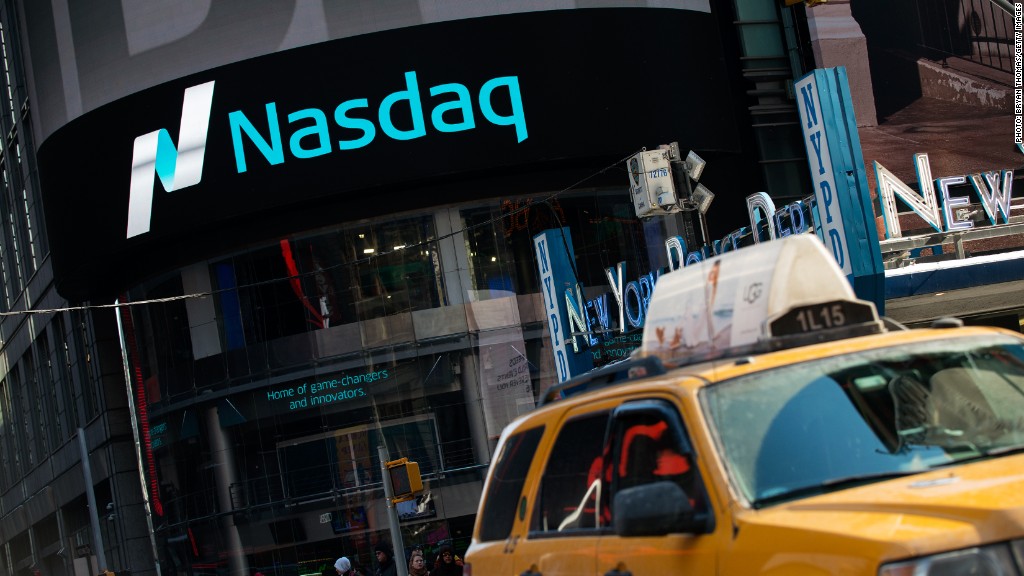
Raging bulls on Wall Street often argue that today's record-high stock market isn't as outrageously expensive as it was in early 2000.
While that's generally true, at least one important measure of stock values is approaching those dot-com bubble-era levels.
The S&P 500 is trading at 2.1 times its trailing revenue, according to FactSet. The last time it was higher? September 2000 when it was at 2.2 as the dot-com bubble was popping.
Elevated valuation metrics like that give ammo to those who fear that the second-longest bull market in history has gotten a bit too hot.
Wall Street pulled off a record-setting trifecta on Wednesday, with the Dow, S&P 500 and Nasdaq all closing at record highs. CNNMoney's Fear & Greed Index of market sentiment flipped to "extreme greed" mode this week.
"Positive emotions may have driven up U.S. stock prices beyond where they should be based on the headwinds," Kristina Hooper, global market strategist at Invesco, wrote in a report.
"That doesn't mean that U.S. stocks will fall soon -- but I believe that they are becoming more vulnerable," Hooper wrote.
Stocks have climbed to new heights this summer despite President Trump's inability to get his economic agenda through Congress thus far. Trump's promises of massive tax cuts, infrastructure spending and deregulation sent stocks soaring after the election. Investors have since dialed back their bets, especially on the timing and size of possible tax cuts.
Instead of focusing on Washington, the market has been kept afloat by robust profits from major American companies in recent months. Wall Street was fired up again this week by strong numbers from the likes of McDonald's (MCD), Caterpillar (CAT) and especially Boeing (BA).
Related: Behind Trump's love-hate relationship with Janet Yellen
For now, investors are paying little attention to lofty valuations, focusing instead on how much money companies are hauling in. But that focus could change -- eventually.
"Valuations don't matter until they do," Peter Boockvar, chief market analyst at The Lindsey Group, wrote in a report that flagged the rising price-to-sales ratio.
Boockvar argued that while valuations are "terrible short term market signals," they "matter very much" in the long run.
Dan Heckman, senior investment strategist at U.S. Bank Wealth Management, said the price-to-sales ratio is an important metric, but a "lagging indicator."
Heckman noted that companies continue to grow their sales -- a trend that he bets will continue, thanks to the slumping U.S. dollar.
Wall Street prefers to value the market based on projected earnings. By that measure, stocks look a bit more reasonable.
The S&P 500 is trading at 17.8 times forward earnings, according to FactSet. That's just a tad below March's 17.9 multiple, which was the highest level since January 2004.
"We don't think the market is cheap, but not overly expensive either," Heckman said.
Related: Will stocks plunge if Trump's tax plan fails?
Market bulls argue that higher multiples are warranted. They point to today's Goldilocks environment: tons of easy money from global central banks, slow but steady growth, low interest rates and stubbornly weak inflation. All of that makes stocks look more attractive.
But market veterans are on guard for what could deliver a jolt to stocks after this long stretch of steady gains.
The S&P 500 has gone 264 days without a pullback of 3% or more, the fourth-longest stretch since 1928, according to Bespoke Investment Group.
"All of these new highs keep your antennae up about what could go wrong or upset the apple cart," said Joe Quinlan, chief investment strategist at U.S. Trust.
Quinlan noted the enormous rally for tech stocks, which have sent the Nasdaq soaring nearly 20% so far this year.
"I wouldn't chase. I don't like buying stocks at all-time highs. I would keep my powder dry," he said.


